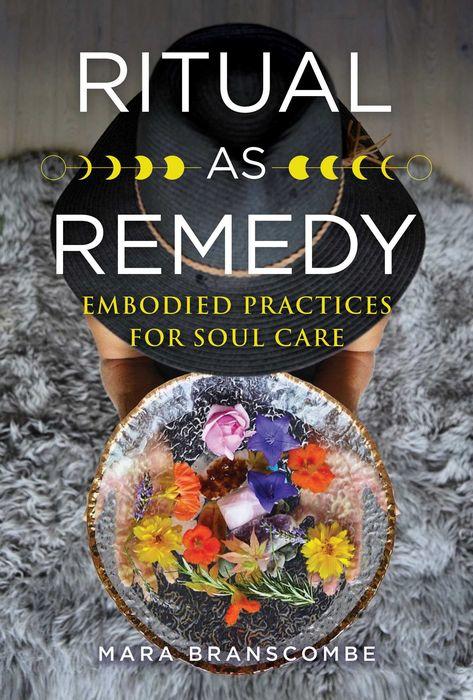I approached this book hoping to learn what author Mara Branscome means by the word ritual and how rituals function as a remedy. What I found is that this book says just a little about these issues and is mostly a compendium of various types of meditation and self-care practices, well suited for someone keen on developing a meditative lifestyle. Branscombe wrote this book in response to changes sparked by the Covid-19 pandemic. She was inspired to share her 28 years’ worth of “self-guided practices for inner peace, balance and intuitive counsel.”
Branscome defines ritual as “anything that is done with intention,” alone or in a group, “formulaic or intuitive.” A ritual can be timed for a season, a holiday, a rite of passage or it can just be sipping tea, or lighting a candle and stating our intentions out loud. By her definition, ritual might take so many forms that one would be hard-pressed to discern an intentional act that is not a ritual. As for how a ritual is a remedy, Branscombe writes that “through self-guided rituals you allow your mind to release the vibration of negativity or doubts and create a spark within. This spark filters from your mind down into your heart, and your intuitive and creative nature becomes enlivened.” Further in, she writes that “every time we activate self-care rituals in an intentional way, a healing takes place. Sometimes the healing is quiet and subtle, other times wildly transformative.”
This is all good, but I was still left wondering: Does ritual really include everything that might be construed as self-care? As a daily meditator, I perform some morning rituals with prayer, breath, and concentration. A bit later, I drink a big cup of coffee and play three New York Times word games on my lap top. It’s intentional. It’s a kind of ritual. Playing these games is good for my brain and I enjoy it, but it is not essential to my well-being as meditation surely is. This book does not make a distinction between what is a vital, spiritual ritual and what is a habit that may happen to be wholesome.
What this book does do well is provide a lot of simple, accessible instructions for establishing a daily meditation practice. There are instructions for breathing exercises, making an altar, working with the elements, using affirmations, sacred bathing, daily journaling, walking meditation. There’s a particularly good chapter on how to establish a regular practice of attunement to the phases of the Moon, and a good page on how to use your own language to call in the four directions. Implicit is the idea that doing these kinds of things is inherently beneficial. This book does not actually explain how ritual changes anyone over time, how it is a remedy.
The writing throughout this book is bland and monotonous, with lots of jargony sentences that are not fleshed out, on almost every page, such as “Celebrate your radiance and raise your energy by reclaiming self-love,” and “The art of communication allows us to feel connected to the world.”
On one level, a newcomer to meditation might wonder what in the heck much of this writing even means. On another level, the book is simple enough that it might make a good gift for a young person who’s just starting out on a path of self-care.
~review by Sara R. Diamond
Author: Mara Branscombe
Findhorn Press, 2022
pp. 287, $18.99
Ritual as Remedy: Embodied Practices for Soul Care

©
2010 - 2025
Facing North
